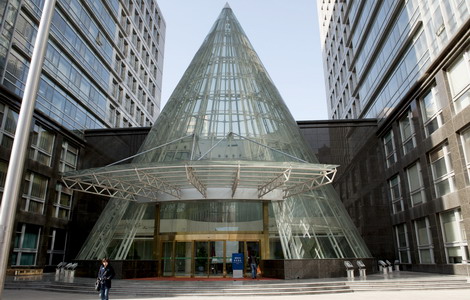 |
|
|
|
|||||||||
|
 |
|
The National Bureau of Statistics building in Beijing. Net income for all large industrial companies was 606 billion yuan ($96.1 billion) in January and February, down 5.2 percent year-on-year, according to the NBS. [Photo / Bloomberg] |
Government likely to use more 'fine tuning' during second quarter
With the National Bureau of Statistics scheduled to report first-quarter economic data on Friday, many Chinese commentators said GDP growth might have only reached 8.4 percent, which would be the lowest since July 2009 and the fifth consecutive decline.
A figure like that is probably the limit of any slowdown that Beijing can accept, analysts said.
"We've already seen an increase in credit supply," said Lu Zhengwei, chief economist of the Industrial Bank Co.
Analysts said it is highly likely that the government will use "fine tuning", as Premier Wen Jiabao calls it, to boost growth from the second quarter on.
A second cut in banks' reserve requirement ratio (the first cut this year was in February) may be in the pipeline, Lu said.
Pan Jiancheng, deputy director of the China Economic Monitoring and Analysis Center, a research unit of the NBS, said business conditions weakened more than expected in the first quarter, dampening companies' profit outlook.
The center's business climate index, based on surveys of some 21,000 companies in eight major sectors, fell to 127.3 in the first quarter this year from 127.8 in the fourth quarter and 135.6 in the third quarter last year.
The NBS earlier said that in January and February, the net income for all large industrial companies was 606 billion yuan ($96.1 billion), down 5.2 percent year-on-year.
Small and medium-sized enterprises, which provide some 70 percent of non-farm jobs, fared even worse, noted Peng Wensheng, chief economist of China International Capital Corp.
If SMEs don't see favorable policy changes, employment could deteriorate, he said.
Economic officials aim to shift China's growth away from government investment and exports to consumer spending. But consumption is the hardest part of the economy to stimulate, especially in conjunction with curbs on urban housing and car sales.
Meanwhile, rising labor costs mean exports are no longer as profitable and orders are less plentiful from North America and Europe.
Customs data show continued deceleration in export growth from 18.4 percent in February to 8.9 percent in March.
Import growth was also unexpectedly weak, at 5.3 percent in March, compared with 39.6 percent in February, a sign of ebbing domestic demand.
So government investment, a major component of fixed-asset investment, remains the driver of the economy, said Zhu Jianfang, chief economist with Citic Securities Co Ltd.
He estimated that fixed-asset investment rose 20.6 percent in the first quarter, compared with 25 percent a year earlier.
Full-year fixed-asset investment might expand 21 percent, compared with 23.8 percent in 2011, Zhu said.
However, Lu said, the central bank may wait before cutting benchmark interest rates.
The rebound in the consumer price index in March, to 3.6 percent from February's 3.2 percent, made monetary policymakers wary of over-stimulating the economy.
"International commodity prices and China's CPI in April must be watched closely," said John Rosee, a visiting professor at the Antai College of Economics and Management of Shanghai Jiao Tong University.
Wang Jun, senior economist at the China Center for International Economic Exchanges, a government think-tank, said there might be some "fine tuning" but Beijing isn't ready for an immediate change in its growth strategy.
"The economy will remain in a slow-speed long cycle," he said, but the goal of a more consumption-driven economy will be retained, he said.
Some State-owned enterprises have lost money, and some small enterprises have failed, he said, but the numbers haven't been large.
"There is still room for the government to help the economy with tax changes and other innovative ways," Wang said.
chenjia1@chinadaily.com.cn